For EARTH students, Earth Day is everyday
At EARTH, every day is an opportunity to have a positive impact on the planet. From their first day at EARTH , students begin developing the commitment, knowledge and tools to implement practical solutions to our most pressing environmental challenges. From recycling and waste management, to renewable energies and environmental education in rural communities, EARTH students are exposed to and involved in a wide range of actions that make a positive impact on their surroundings and transform the reality in which they live.
Sharing knowledge with younger generations
It is 6 a.m. and third year students from the Applied Ecology class are leaving campus with EARTH professor Julio Tejada. Today’s class will take place in the rural coastal community of Tortuguero in the Tortuguero National Park in Limón, Costa Rica. During this class, rather than just acquiring knowledge, they will have the opportunity to share what they know with local high school students.

Ricardo Brenes ( '10, Costa Rica) and Sonia Calvo ( '07, Costa Rica) currently work in the Tortuguero community.
After the three hour journey, one and half by bus and another hour and half by boat, they arrive at this small town surrounded by water. Kids are anxiously gathered in the school’s cafeteria. A very different school day for everyone begins. Without wasting time, students divide into small groups that will work on various topics–recycling, climate change, water, rainforest conservation and protecting coastal communities.
One group takes a trip to Tortuguero’s recycling plant. Among piles of waste, the EARTH students explain the importance of recycling to Tortuguero’s youths while the workers guide them through the different stages of the sorting process. Santos Fonseca , the head of this plant, explains that bringing school children here helps him and his team, because it teaches them about the usefulness of proper waste management at home.
Meanwhile, at the high school another group is planting an organic garden. Tomatoes, onions, cucumber and lettuce are sown with the purpose of teaching these young people the importance of growing their own food in a sustainable and responsible way.
Gladys Morelia Abrahams, a 17 year old high school student, is inspired by the day’s activities: “I want to be an environmental engineer; that is why I’m happy that they [EARTH students] are here to share their experience as college students with us.”
At 3 p.m. and after a lot of hard work it is time to leave. A long trip back to campus awaits professor Tejada and his class; however, the satisfaction of having planted a seed in Tortuguero is reflected in their faces.
Carrying hope to their home country
When Amos Montreuil (Haiti,’13) first came to EARTH he wasn’t fully aware of the environmental issues affecting his home country. After three years at the University both Amos and his classmate Lynhe Demesyeux (Haiti, ‘13 ) feel the urgency of addressing the devastating reality of Haiti.
Ninety eight percent of Haiti’s natural forests have been deforested and about 30 million trees are cut down each year. “Besides being poor we have very few trees left, so we see that this is not only affecting the beauty of our county, it also has very negative impact on the people who live there because they are more vulnerable to natural catastrophes,” Lynhe explains.
Both students agree that one of the main problems is the production of wood charcoal. Amos and Lynhe decided to join efforts in their graduation project to promote biogas as an alternative to charcoal for cooking.
Factoring in the economic limitations of the Haitian population, this pair is focusing their project on building bio-digesters that can be made out of affordable materials found locally to keep costs down.
“What we want to do is to apply what we learn here about bio-digester technology and adapt it to the reality in Haiti,” Amos explains.
“The degradation of the environment in Haiti is a fact,” he continues. “Being in the country I couldn’t see the problem, but once you get out and especially being here at EARTH where we develop our environmental consciousness, it makes you see things you couldn’t before,” says Amos, reflecting on how his education has changed his worldview.
Throughout the world, EARTH students and alumni have a direct and positive impact on the environment through their efforts in waste management, bio-digesters, organic farming, soil and water conservation, and alternative energies.
This Earth Day and beyond, join us in preparing the next generation of agricultural leaders with the capacity and commitment to balance the needs of people with the needs of our planet.
in preparing the next generation of agricultural leaders with the capacity and commitment to balance the needs of people with the needs of our planet.






Sonia Calvo es promoción 2007.